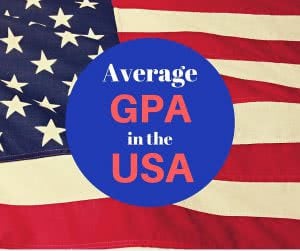
The average GPA in America for high school students is 3.0, and 3.1 for college students. While this number is important to your education, it also isn’t everything and doesn’t define you as a student completely. Here’s what you need to know about average grades in the United States and how that relates to your future opportunities.
What is a GPA?
GPA stands for “grade point average.” It is the culmination of a student’s grades and hard work in their classes, either during K-12 or college. They can give you a picture of how you stack up against other students. Your GPA is also an important factor in things like college applications, job opportunities, honors and recognition, scholarships, grants, and financial aid.
Most schools use a 4.0 scale, but there are exceptions (we’ll get to this in a moment). The higher your GPA, the better you are performing in school. 4.0s can relate to A and A+, while 3.0s can be equal to a B.
Your GPA can affect your college acceptance chances, but when you’re in college, you need to keep your GPA above a certain mark to maintain satisfactory standards set by the school. If you don’t you could be put a probationary period or have to leave the college.
What is the Average GPA in America?
Recent studies show that the average GPA for students in high school in the United States is 3.0. It’s slightly higher for college students at 3.1.
However, you can’t just look at that number by itself.
There’s More to a GPA Than Meets the Eye
While a GPA can give you a good picture of how well you scored in classes, the number on its own doesn’t give you or the college much information about your abilities! The average GPA in the United States, too, can be impacted by quite a few different factors.
Weighted GPA Vs Unweighted GPA
First, GPAs can be unweighted or weighted. An unweighted GPA uses a 4.0 scale and does not take the difficulty of your coursework into account. A weighted GPA, however, can use a 5.0 scale (though others are used) and take difficult classes, such as advanced courses, into account – these advanced courses are worth more. So therefore, it’s possible to earn above a 4.0 at some high schools!
Academic Rigor
While a weighted GPA can give some insight into academic rigor, that doesn’t mean that those advanced classes mean nothing if you have an unweighted GPA. Colleges will look at your transcripts and see the types of courses you took. AP coursework is often weighted by higher institutions to be “worth” more since the classes are more challenging.
Core classes, on the other hand, are considered standard. This is because every student has to take them at one point or another.
So does that mean an A in an AP class is worth more than an A in a core class? While it may not technically boost your unweighted GPA, it will affect your acceptance odds at colleges.
And it’s okay if you don’t earn an A in your AP class. Even if you earn a B and it brings down your GPA, your college will take note that you took advanced classes!
What Else Do College Consider Besides Your GPA?
While your GPA and academic rigor will give your potential colleges some information about your academic abilities, it’s not the only thing they look for, even if your score is right in line with the GPA average throughout America.
Colleges also look at
- Application essay
- Demonstrated interest
- ACT / SAT scores
- Extracurricular activities
- College interviews
- Community involvement/volunteer work
- Leadership qualities
- And more!
What Else Do Scholarships Consider Besides Your GPA?
Scholarship programs often look beyond your GPA as well. While a minimum GPA may be required for some merit-based awards, many programs also ask for additional qualifications and information. This can include:
- Community service contributions
- Demonstrated financial need
- Essays
- Intended majors
- Location
- Extracurricular
So whether your GPA is right on the money for the national average, slightly above it, or slightly below it, don’t fret. There is more than meets the eye when it comes to grade point averages, and colleges look at more than this number. While a higher GPA can definitely help give your college admission chances a boost, it truly isn’t everything!
Use College Raptor to discover personalized college matches, cost estimates, acceptance odds, and potential financial aid for schools around the US—for FREE!




